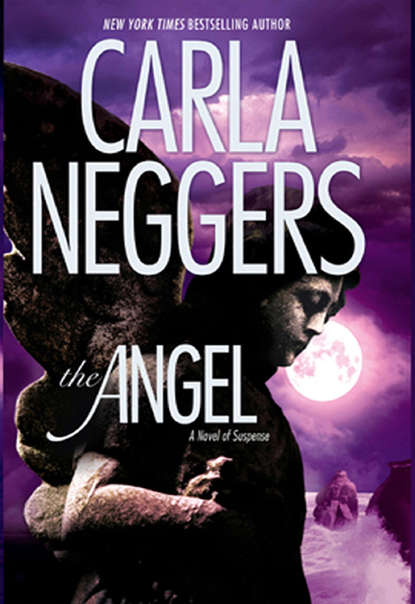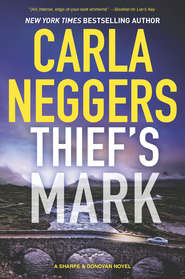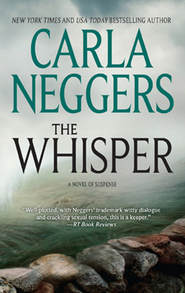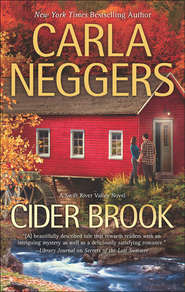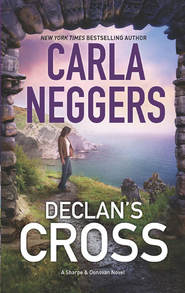По всем вопросам обращайтесь на: info@litportal.ru
(©) 2003-2024.
✖
The Angel
Автор
Год написания книги
2019
Настройки чтения
Размер шрифта
Высота строк
Поля
“They were fantastic,” Colm interjected.
Fiona beamed and headed across the room with Owen.
Colm turned back to Keira with a smile. “Fiona’s more like her father than she thinks, isn’t she?” But he didn’t wait for an answer, his smile fading as he continued. “If there’s anything I can do, you know how to reach me.”
“I appreciate that. Thanks, Colm.”
He rushed off to speak to someone else, and Keira found herself another glass of champagne. As she took a sip, feeling calmer, she noticed small, white-haired Patsy McCarthy in the foyer.
Keira immediately moved toward her. “Patsy—please, come in. I’m so glad you could make it.”
“Thank you for inviting me.” Within seconds of meeting almost a month ago, Patsy had dispensed with any formalities and insisted Keira call her by her first name. She nodded back toward the door. “I thought it’d never stop raining.”
“I know what you mean. It was quite a downpour.”
With a sudden move, Patsy clutched Keira’s hand. “I wanted to see you before you left for Ireland. You’re going to look for the stone angel, aren’t you?”
“I’ll be in the village that undoubtedly inspired the story—”
“You’ll be there on the summer solstice. Look for the angel then.”
The summer solstice played a key role in the story. “I’ll do my best.”
“The Good People want to find the stone angel as much as you do. The fairies, I mean. The angel’s been missing for so long, but they won’t have forgotten it. If you’re clever, you can let them help you.” Patsy dropped Keira’s hand and straightened her spine. “I’m not saying I believe in fairies myself, of course.”
Keira didn’t tackle the older woman’s ambivalence. “If they believe the angel’s one of their own turned to stone and want it for themselves, why would they help me?”
“That’s why you must be clever. Don’t let them know they’re helping you.”
“I’ll try to be very clever, then.”
“The brothers will be looking for the angel, in their own way. They and the fairies all want the tug-of-war over it to resume. It’s meant to resume.” Patsy tightened her grip on Keira’s hand. “If you find the angel, you must leave it out in the open. In the summer sun. It’ll get to where it belongs. Don’t let it go to a museum.”
“I promise, Patsy,” Keira said, surprised by the older woman’s intensity. “I’ll look for the angel on the summer solstice, then, I’ll be clever and if I find the angel, I’ll leave it out in the sun—assuming that’s up to me. The Irish might have other ideas.”
Patsy seemed satisfied and, looking more relaxed, released Keira’s hand and eyed a near-empty tray of chocolate-dipped strawberries.
Keira smiled. “Help yourself. Would you like to take a look around?”
“I would, indeed,” Patsy said, lifting a fat strawberry onto a cocktail napkin. “I have every one of your books, you know. Do you think you’ll illustrate my story one day?”
“I’d love to.”
“That’d be something. It’s a good story, isn’t it?”
“It’s a wonderful story.”
Patsy smiled suddenly, her eyes lighting up. “Irish brothers, an angel and fairies. All the best stories have fairies, don’t you think?”
“I love stories with fairies.”
With Keira at her side, Patsy ate her strawberry and moved from artwork to artwork, as if she were in a museum, gasping when she came to Keira’s two paintings. “Oh, Keira. My dear Keira. Your paintings are even more incredible in real life.” She paused, clearly overcome by emotion. “This is the Ireland I remember.”
Whether it was an accurate statement or one colored by time and sentiment, Keira appreciated Patsy’s response. “It means a lot to me that you like my work.”
When Patsy finished her tour of the drawing room, she took another chocolate-covered strawberry and started for the foyer. “Can I see you back home?” Keira asked.
Patsy shook her head. “My parish priest drove me. Father Palermo. Like the city in Sicily. He couldn’t find a parking space, so he’s driving around until I finish up. Did you know that my church is named after Saint Ita?”
Keira smiled. “The Irish saint in your story.”
“It’s strange how life works sometimes, isn’t it?” They walked outside together. A simple black sedan waited at the curb. A handsome, dark-haired man in a priest’s black suit and white clerical collar got out and looked across the car’s shiny roof. “Are you ready, Mrs. McCarthy, or shall I drive around the Common one more time? I don’t want to rush you.”
“I’m all set. This is the artist I told you about, Father. Keira Sullivan.”
“Ah. Miss Sullivan. I’ve heard so much about you.”
Keira couldn’t read his tone, but Patsy added politely, “Keira, I’d like you to meet Father Michael Palermo.”
He tilted his head back slightly, as if appraising her. “Mrs. McCarthy tells me you’re collecting stories from twentieth-century Irish immigrants.”
“That’s right. She’s been very generous with her time.”
Patsy waved a hand in dismissal. “I’m just an old woman with an ear for a good story.”
Father Palermo kept his gaze on Keira. “Your mother grew up a couple doors down from Mrs. McCarthy.”
“Two,” Keira said without elaboration. “A pleasure to meet you, Father.”
“Likewise.”
He climbed back in behind the wheel, and Patsy got into the passenger seat and smiled at Keira. “Give my love to Ireland,” she said with a wink.
After they left, Keira lingered on the sidewalk. The wind had picked up, but after the heat and humidity of recent days, she appreciated the drier conditions that came with the gusts. The puddles that had formed in dips in the sidewalk would be dry by morning.
“So you’re off to Ireland in search of angels and fairies.” Simon Cahill grinned at her as he leaned against the black iron railing to the steps of the Garrison house. “Do you believe in fairies?”
“That’s not what’s important in my work.”
“Ah, I see. That’s a dodge, but whatever. Keira, right?”
“That’s right—and you’re Simon. Owen’s friend. I didn’t realize you were still here.”
“I have to pay for my painting.”
“Your painting?”
“Your watercolor of the Irish cottage. I couldn’t resist.”





